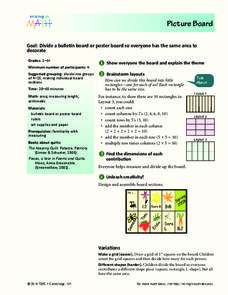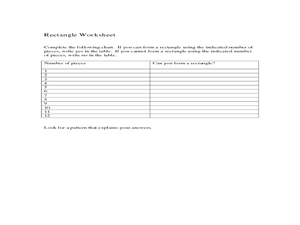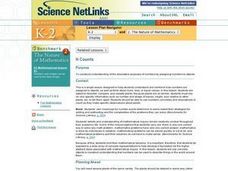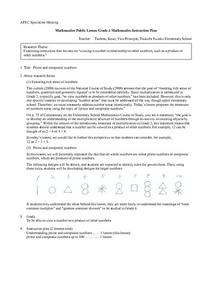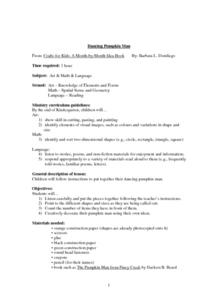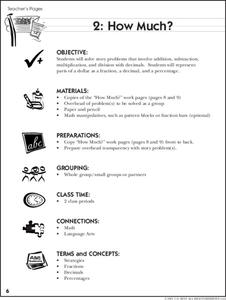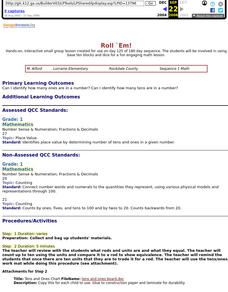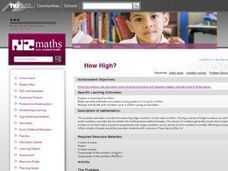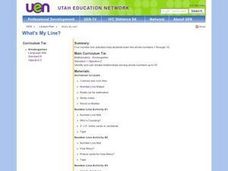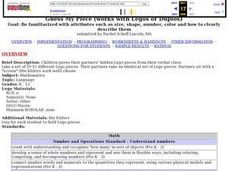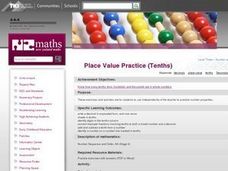Curated OER
Picture Board
Learners divide a poster board so everyone gets the same amount of area to decorate. Youngsters talk about the different ways to divide a rectangle. They measure their lines to make sure that each piece is equal and then decorate their...
Curated OER
Area, Perimeter and Rations Using Pentominoes
Learners of all ages investigate area and perimeter through pentominoes. In this geometry activity, students calculate the are and perimeter of different geometric shapes and describe the properties of similar and congruent shapes. This...
Curated OER
It Counts
Students classify and compare plants using specific information, observations, and numbers. In this mathematical inquiry instructional activity, students use plant characteristics to describe, compare, and classify them. They attempt to...
Illustrative Mathematics
The Florist Shop
A real-world approach to common multiples asks learners to find different groups of flowers based on their multiples. Useable as a class activity or independent exercise, they will have to organize their thoughts to explain the totals of...
Curated OER
Prime And Composite Numbers - Fuzoku Elementary
Fourth graders investigate the concept of prime and composite numbers. Students study the visual representation for the numbers and use the pictures in order to develop designs for larger numbers. The goal of the lesson is for them to...
Curated OER
Dancing Pumpkin Man
Students listen carefully and put pieces together following the teacher's instructions. They point to the different shapes and sizes as they are being called out and count the number of items they have in front of them. They decorate...
Curated OER
How Much?
It's time to go back over all that your class has learned about decimals, fractions, and percentages! To do so, individuals solve story problems that involve addition, subtraction, multiplication, and division with decimals, explain how...
Curated OER
Pumpkin Seed Experiment
In this unique activity students participate in a pumpkin seed experiment. Students interact with the pumpkins weight, seeds and record their findings of what lies within the pumpkin once the top of the pumpkin is cut off for...
Curated OER
Problem Solving: Steps and Strategies
Students explore the concept of problem solving strategies. In this problem solving strategies lesson, students discuss methods for solving problems such as re-reading a problem, stating the facts, drawing a picture and so on. Students...
Curated OER
Going out of Business: Pythagorean Theorem
Students find the length of diagonals. In this Pythagorean theorem lesson, students use the Pythagorean theorem to determine the length of diagonals.
Curated OER
Roll `Em!
First graders engage in using base ten blocks and dice for a fun engaging math lesson. They use a worksheet imbedded in this lesson as the game board to help them play this math game.
Curated OER
Bean Addition
A hands-on lesson created students use beans as manipulatives to solve addition number sentences. Requires the book, Mission Addition by Loreen Leedy.
Curated OER
Who Has More?
Pupils engage in a lesson that is concerned with the standard of comparing the quantities of whole numbers using different strategies from the concrete to the abstract. They count objects and compare them, use symbols of comparison, and...
Curated OER
Connecting Formulas Related to Geometric Figures
Students identify diagrams of quadrilaterals and circles by different names and classify the figures. They name the areas for each diagram and practice solving the formulas for each.
Curated OER
Graphs of the OTHER Trig Functions
Students graph trigonometric functions. In this precalculus lesson, students identify the properties of secant ,cosecant and cotangent. They use the unit circle as their formula to graph and analyze these functions.
Curated OER
Fraction City
Learners calculate equivalent fractions, solve the addition of fractions of like and unlike denominators, and compare fractions using fraction strips. They fold paper strips into equal parts, thirds, sixths, ninths, and twelfths, and...
Curated OER
How High?
Fourth graders play an estimation game to guess how sheets of paper are in a pile and then guess who high a stack of one million would be. They work in small groups to explore ideas for working out how high the stack would be.
Curated OER
Language Arts: What's My Line?
Students discover how to employ number lines by estimating the number of tiles in a jar. After writing their estimates on sticky notes, they place them in order on a number line mat. Included in the lesson are various activities and...
Curated OER
Pea Brain! Explorations in Estimation
Students estimate how many peas fit in a container. In this science lesson, students calculate the weight of a pea and record it. They use this data to calculate how many peas fit in a human brain.
Curated OER
Guess My Piece -working with Legos
Students participate in guessing their partners' hidden Lego pieces from their verbal clues. They work in partners to accomplish their goals. They are meeting a variety of math standards by completing this instructional activity.
Curated OER
What's Your Function?
Second graders read the rules of how they can balance the scale by placing beans in the square, circle, and the triangle. Next, they balance 12 beans using the scale and then try to balance it with 15 beans, and then 18 beans. They then...
Curated OER
It Counts
Pupils understand and reinforce how numbers are assigned to objects, as well as think about more, less, or equal values. In this lesson, students are asked to describe, compare, and classify plants. They should be able to use numbers...
Curated OER
Data Analysis, Probability, and Statistics: Exploring Websites
Students measure their pulse rates and place the number on the board. They arrange the numbers in order and discuss the differences between isolated facts and data. Students explore websites that relate to data analysis and report their...
Curated OER
Place Value Practice (Tenths)
Young scholars practice strategies solving problems with basic facts, framework, domain and early additive part-whole. They recall the compatible numbers to ten, solve problems with small numbers using a part-whole strategy and recall...
